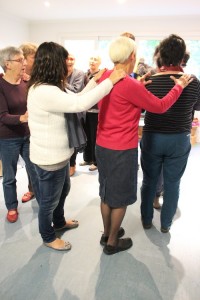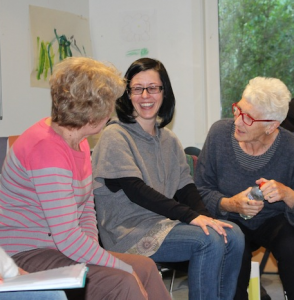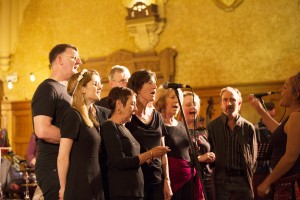When she arrives at Kensington Neighbourhood House on Wednesday nights Gregoria is always tired out. For the 41 year-old, Wednesday is the busiest day of her working week at the University of Melbourne.
‘I’m a bit of a workaholic,’ Gregoria says. ‘By the end of the day I’m totally drained, but then I come along to choir and I’m totally regenerated. I go home on an absolute high.’
KenSingers kicks off at 7.30 pm. Each session includes vocal exercises, something old to practise and something new to learn for the choir’s repertoire.
The choir is a mixed group with people aged from 19 to 69, men and women from all walks of life.
Tom, 19, is the youngest member who joined because singing offers a good contrast to his full time studies in computer programming.
Anne, 69, joined after her husband died. ‘It was lovely to get out of myself and away from grief and sing with an open heart.’

Choir director Jo Windred leads the group in some warm-ups and the group circle the room limbering up their voices, flexing their vocal chords and making a happy racket. What’s obvious watching this group is that any worries or tiredness is left at the front door. With their heads back, eyes closed and mouths open in song you can see how good singing makes people feel.
Since the ‘Choir of Hard Knocks’ made community choirs famous, they have mushroomed around Australia. Often auspiced by local community organisations including neighbourhood houses, community choirs involve a lot more than just encouraging people to sing.
Research shows benefits of choirs
There’s growing evidence that being part of a choir does more than simply make people feel good. Forming new friendships, developing networks in local communities; improving confidence and getting jobs are just some of the benefits of singing with others.
Monash University’s Associate Professor Jane Southcott has conducted research on the benefits of being part of a community choir. ‘Singing makes you feel good, it’s a very uplifting activity, but it also improves your cognitive skills, as well as your physical wellbeing. It gives people pleasure and brain research shows that singing is good for your overall attitude and happiness.’
Singing in a choir can be very liberating too. You don’t have to read or write to be in a choir Jane says. ‘No one asks what you do or who you are. You’re all just there to sing. You’ve all got something in common.’
Being part of a choir is a great informal learning experience. ‘There’s lots to commit to memory, you’re memorising new songs and practising old ones. A lot of conductors don’t assume you can read music so you can learn by listening to recordings. It’s very informal teaching that focuses on developing people’s confidence.’
Choirs build community
Jane’s research has found that the most successful choirs are those supported by a community organisation that offers the kind of practical support that keeps the choir going – from rehearsal and performance space to advertising in their newsletters.

Gregoria (centre) and Anne (right).
And the benefits go both ways. Each time a choir performs in public it spreads awareness of the centre that hosts it as well as inspiring other members of the community to think about taking up singing.
KenSingers perform at community events from school fetes and festivals to workshops to community events. Choir members are constantly learning with master classes, big sings, workshops and visiting guests.
For Gregoria it was not a public performance that got her interested in joining a choir but the Kensington Neighbourhood House brochure that arrived in her letterbox. ‘I’d loved singing as a child and I missed the joy singing used to give me. The description of the choir in the brochure was so friendly and inviting that I thought, “This is for me.”’

